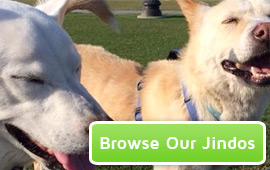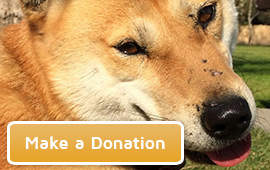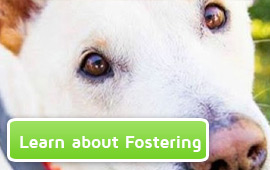Alpha dogs and pack mentality
We’ve all heard the advice that as dog owners, we should be the alpha dog or pack leader in our house or else our dogs will assume the role, take over, and pretty much make our lives miserable. That’s the basic theory behind traditional dog training methods, made even more popular by a certain TV-show dog rehabilitator. The training style commonly uses dominance and force-type methods based on the notions of alpha dogs and pack mentality. Those concepts evolved from studies done more than half a century ago while observing wolves in captivity.
In contrast, positive reinforcement (+R or force-free) training takes a different approach based on using rewards to train and shape dog behavior, often controlling the resources a dog wants or needs and encouraging appropriate behavior out of the dog’s own self interest. In the world of positive reinforcement training, the terms alpha and pack leader are usually considered taboo, as they’re often associated with using force, threats or intimidation and sometimes create anxious or fearful reactions from dogs. But in this era of political correctness, have we gone too far in totally dismissing the notions of alpha dogs and pack mentality?
“In this era of political correctness, have we gone too far in totally dismissing the notions of alpha dogs and pack mentality?”
My Thoughts on Alpha Dogs and Pack Mentality
I’m a big believer in positive reinforcement training but I also know how effective a well-timed correction can be, as I talked about in the post Using Corrections With Positive Reinforcement Training. I believe domesticated dogs are still pack animals and even though we’re not part of a traditional canine pack with them, we are part of their social pack. As in any pack, there’s usually a leader that sets the rules for acceptable behavior and if the leader governs with fairness, rather than fear, there will be mutual respect and harmony within the group. In both animal and human social circles, I’ve noticed there’s usually a status ranking or pecking order between members of the social group. Here are a few examples.
Entering a new work environment is stressful because you’re often unsure about how you’ll fit in with your peers. Once you’ve met and sized up your co-workers, you feel more comfortable about your place within the business and social hierarchy. It can also be stressful to the group when a new co-worker joins the team as the team’s hierarchy could be restructured.
When my parents had their horse farm, it was interesting to watch the adjustment period when a horse was moved into a different pasture with an established group of horses. The pecking order would often get reshuffled as the newcomer tried to figure out where they fit into the existing hierarchy of the herd. After some kicking, chasing and displays of dominance and submissiveness by several of the horses, a new pecking order would be established and harmony was restored.
When taking a new dog into a dog park with a group of regulars that play together, you can expect the regulars will be anxious to check out the newcomer and along with lots of butt sniffing, there might be some growling, snapping and posturing as members of the now larger pack figure out how the newcomer fits in.
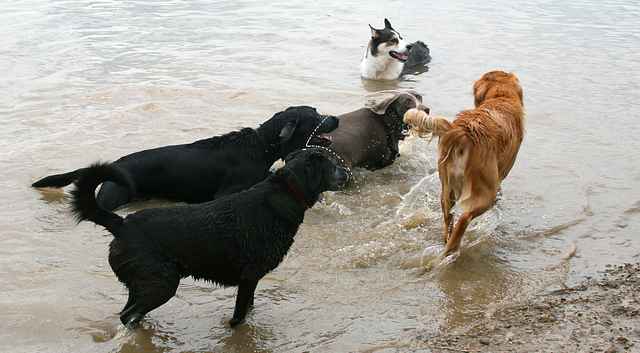
Am I the Alpha in Our Pack?
Yes, I do think of myself as alpha over Haley. It’s a popular notion these days for dog owners to think of themselves as equals with their dogs. Even the term dog owner is offensive to some people, but I’ll save that topic for another discussion. I don’t see myself as an equal to Haley because somebody has to create and enforce the rules, provide the food and shelter, drive to the vet’s office for medical care, etc. It’s my responsibility to assume the alpha role although I’m not sure Haley views me the same as she would view an alpha dog in a canine pack. What’s more important is the fact that we have a hierarchical structure based on mutual respect, and it works very well for us. Here are my roles and responsibilities as an alpha.
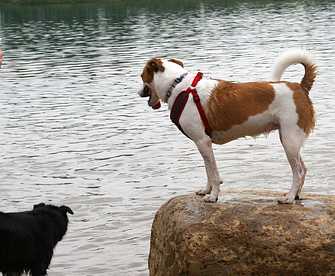 It’s a shame that the terms alpha and pack leader have become so closely tied to old-school, discipline and dominance-based training methods because the principles are still relevant and important. Some people may dislike the terms, but that doesn’t change the fact that someone has to lead, set the rules and keep the peace. In fact, the lack of leadership and structure is one reason some out-of-control dogs are surrendered to shelters by frustrated owners at their wits end. It’s also worth noting that every dog is different and some need more structure and guidance than others, but it should always be given via positive and humane methods built on trust and respect.
It’s a shame that the terms alpha and pack leader have become so closely tied to old-school, discipline and dominance-based training methods because the principles are still relevant and important. Some people may dislike the terms, but that doesn’t change the fact that someone has to lead, set the rules and keep the peace. In fact, the lack of leadership and structure is one reason some out-of-control dogs are surrendered to shelters by frustrated owners at their wits end. It’s also worth noting that every dog is different and some need more structure and guidance than others, but it should always be given via positive and humane methods built on trust and respect.
If your goal is to have a dog that listens and respects you, forget the notion of submissive alpha roles or making sure your dog never goes through a door before you. Focus instead on using positive methods of training your pup and you’ll become a truly benevolent and respected alpha in your pack.

